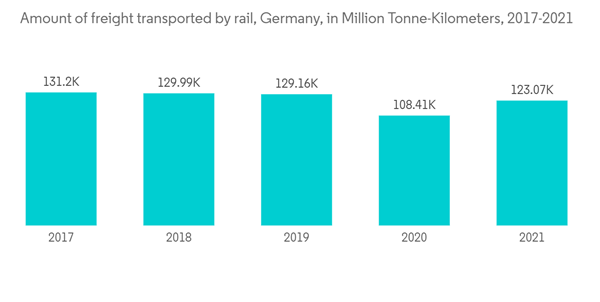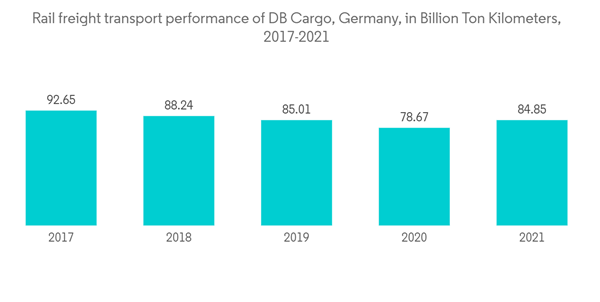Key Highlights
- According to the European Railway Performance Index, which ranks national European rail systems by the intensity of usage, service quality, and safety, Germany's rail system came in fourth place overall. Germany received very high marks for both the quantity and frequency of use by both passengers and freight, as well as for the level of service provided and safety. Additionally, Germany's cost-to-performance ratios outperformed the average for all of Europe, capturing comparatively high value in return for public expenditure.
- For sustainable mobility solutions, Germany will serve as a model market and a global market leader. This will have been done in the area of rail freight with a dual-track plan that supports both a further cut in emissions and the use of alternative drivetrains in the field of road haulage and, as important, the modernization and improvement of the rail freight sector's competitiveness. A key component of the German and European freight transportation systems will be rail freight. Its environmental friendliness will assist in meeting Germany's and Europe's carbon reduction goals, make freight transportation safer, and ease traffic congestion.
- Three German rail associations proposed increasing parcel rail transportation in the country. Some of the key actions include a toll exemption for combined transportation, the construction of more sidings, and the establishment of new combined transportation hubs. The three associations listed the three most important rail corridors that require increased capacity for parcel deliveries in a position paper. They are the lines that connect Nuremberg-Hannover in the country's center, Stuttgart-Berlin in the southwest to the northeast, and Hamburg-Munich in the north to the south. Furthermore, the three parties are requesting that these corridors be linked to the Rhineland/Ruhr region. The request is justified by the fact that parcel shipments are increasing year after year as a result of growing online trade, as the associations pointed out.
Germany Rail Freight Transport Market Trends
Rising investment in infrastructure, digitalization and modal shift
- Eight railroad associations made their top requests known to the incoming federal government. Three billion euros per year for infrastructure, complete digitalization of the railroads by 2035, and a minimum of two-thirds of infrastructure expenditures in the rail network to hasten the modal shift. The eight railway industry associations recognise that the current government coalition has already increased the financial resources for the rail sector.
- However, the Allianz pro Schiene (Alliance for Rail), the umbrella organisation for transport authorities for local rail passenger transport BAG SPNV, the alliance for fair competition in passenger rail Mofair, the Network of European railways (NEE), the Mobility Association Germany (VCD), Verband der Bahnindustrie, the Association of German Transport Companies (VDV) and the Association for Freight Wagon owners (VPI) call for the future federal government to increase the pace and give rail priority.
- Through digitalization, rail infrastructure and operations are both becoming more dependable and efficient. Four points are highlighted by the German rail organisations to support this. First and foremost, they support a specific objective of digitising the whole German rail network by 2035.
- Digital Automatic Coupling has been proposed as the primary technology for increased railroad freight transit effectiveness (DAK). It would cost more than eight billion euros to refit the 450 000 freight cars across Europe in this decade. They emphasise in the document that businesses require financial support from the EU and the federal government to complete this mission.
Germany to fund private rail connections to encourage rail freight
- In order to promote rail freight shipping, the German government is boosting the money available for private rail connection investments. In order to give businesses additional incentives to send their goods and products on the more ecologically friendly rail, the Federal Ministry of Transport and Digital Infrastructure (BMVI) is stepping up its efforts to improve business access to the rail network.
- Up to 50% of the costs for new and expanded connections, as well as for the reactivation and maintenance of current connections, will be funded by a federal funding scheme starting on March 1, 2021. From 2021 onward, the funds from the previous year will be increased by more than twice as much, reaching 34 million euros. The funds will later be increased to 49 million euros starting in 2024. The program has a five-year budget of 200 million euros overall. The Transport Ministry also wants to accelerate private investment in new access points through faster planning and fair cost sharing. Possible barriers that could discourage private investments are also among the main focal points. Private rail connections are linked to the rail network via a switch. The infrastructure companies, like DB Netz, are increasingly transferring their costs for operation and replacement, to private investors alone. For a fair distribution of costs, the BMVI issued a legal clarification in the General Railway Act.
Germany Rail Freight Transport Market Competitor Analysis
The Germany Rail Freight Transport market is fragmented and is expected to grow during the forecast period due to the growth in the industrial trade, increased pressure on road transport, and several other factors. Deutsche Bahn AG, CHS Container Handel GmbH, concert logistics unirail GmbH, conro container GmbH, Container Terminal Dortmund GmbH (CTD), DB Cargo BTT GmbH, DeltaRail GmbH, Duomobile GmbH, EKB Container Logistik, EKOL Logistik GmbH are major market participants in Germany Rail Freight Transport MarketAdditional Benefits:
- The market estimate (ME) sheet in Excel format
- 3 months of analyst support
Table of Contents
Companies Mentioned (Partial List)
A selection of companies mentioned in this report includes, but is not limited to:
- Deutsche Bahn AG
- CHS Container Handel GmbH
- Concert logistics unirail GmbH
- Conro container GmbH
- Container Terminal Dortmund GmbH (CTD)
- DB Cargo BTT GmbH
- DeltaRail GmbH
- Duomobile GmbH
- EKB Container Logistik
- EKOL Logistik GmbH










